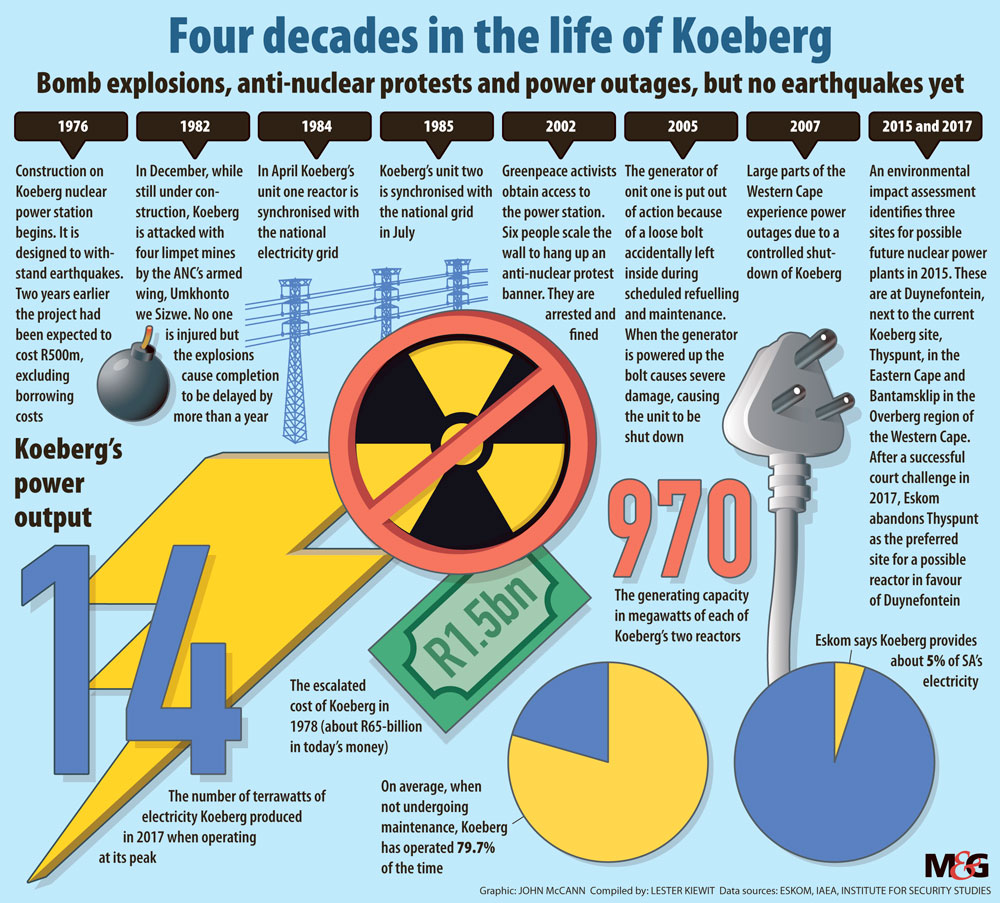Ailing power utility Eskom has warned it will have to ramp up load-shedding during the winter months.(Photo: David Harrison/M&G)
Civic groups and environmental bodies are crying foul over a public participation process — for regulations to extend the lifespan of the Koeberg nuclear power plant — which they say was held, unfairly, during lockdown.
In 2019 Eskom and the department of minerals and energy (DME) announced plans for a refurbishment of South Africa’s only nuclear energy power plant, situated about 30 kilometres north of Cape Town.
Presently, Koeberg is licenced to operate until 2024 before being decommissioned. But the energy utility and government had said shutting it down would put pressure on an already erratic and unstable national energy grid. It also said the plant was well maintained and could continue to operate.
An announcement was then made to consider keeping the facility operational until 2044.
In July this year, a 60-day public participation process was opened to gain public insight into regulations surrounding the long-term operation of nuclear facilities.
But campaigners argued the process was flawed as it fell within the ongoing national state of disaster and lockdown period.
In a letter to Eskom and the minister of mineral resources and energy, Gwede Mantashe, nuclear watchdog group Koeberg Alert Alliance said the comment period during the lockdown was unfair and ill-advised.
Speaking to the Mail & Guardian, Koeberg Alert Alliance’s Peter Bekker said the process to seek public opinion on the future of Koeberg appears to have been fast-tracked.
“These regulations at first reading appear to be aimed at enabling the Koeberg nuclear plant to operate beyond its design limit of 2024, and on until 2044. This has serious potential safety implications,” the group said in a letter to Mantashe.
“We are all volunteers and so would normally meet in someone’s home to work together on studying the relevant documents and compiling a submission. Doing so now would be breaking the law in terms of the lockdown regulations. Since these draft regulations may be part of a process which results in a licence to operate for the next 24 years, it does not seem fair to rush this process through in a matter of weeks. Especially at a time when lockdown regulations make public participation more difficult,” the group added.

He further claimed that an email address used to facilitate public comment was non-operational.
Bekker showed evidence of sent emails being returned undelivered with an error message.
“They knew its lifespan was coming to an end, so it’s a bit strange they had to have this consultation process right now [during lockdown]. Perhaps they just woke up? Perhaps there was no malicious intent. But whatever the reason, it means the normal public participation process had been made extremely difficult,” Bekker said.
The DME’s deputy director general responsible for nuclear development, Zizamile Mbambo, said the department was satisfied with the number of public responses it had received. He conceded, however, that the lockdown period may have prevented more people from commenting.
“When the comment period started, it was a 60-day period. We have received a number of comments coming from the public, and we appreciate that. We are cognisant this took place during the Covid-19 national lockdown, and we are considering an extension to the comment period so we can receive further input,” Mbambo said.
Mbambo could not say offhand how many public contributions were received.
Mbambo reiterated statements contained in the department’s 2019 integrated resource plan on the importance of Koeberg on the country’s energy mix.
“Koeberg is the most efficiently operated power plant in Eskom. It provides about five percent of our electricity and provides for grid stabilisation. Therefore, it is one of the most cost-effective stations because of the operational cost of nuclear powers which is generally lower to base load power stations,” he said.
Bekker said the cost-per megawatt produced by Koeberg might be relatively affordable now, but added any planned infrastructure refurbishment to prepare for the plant extension would affect the cost of already sky-rocketing electricity prices for consumers.
Recently, the Southern African Faith Communities’ Environment Institute made several requests for information on the cost and safety implications on keeping Koeberg operational until 2044.
In a statement, the organisation’s Francesca de Gasparis said it had filed a request under the Promotion of Access to Information Act on the extent of the plans for the nuclear power plant, as well as about the bill to taxpayers for the planned lifespan extension.
“It is vital that the people of South Africa should know all the possible cost implications of extending Koeberg’s plant life. We need to see any studies — such as the business case or cost-benefit analysis — for us to determine whether there might be better ways to spend the money to generate electricity, other than extending an ageing plant located in such close proximity to the country’s second-most populous metro.”